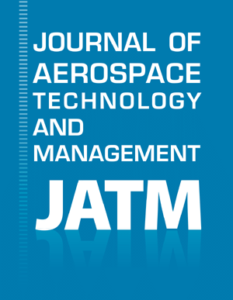Teresa Raquel Pereira Domingos, Airworthiness Engineer at EMBRAER S.A., member of the study group for innovation management in complex systems, at INPE, São José dos Campos, São Paulo, Brazil.
 In the article “Hard and soft paradigm analysis in knowledge creation projects: an aeronautical certification case”, published in the Journal of Aerospace Technology and Management (JATM, vol. 13), issues related to uncertainty present in knowledge creation projects are addressed. Abstract, intangible and unpredictable — these are some of the characteristics of these types of projects that have guided organizations today. Therefore, the study analyzes a project with the same characteristics to identify the levels of uncertainty present in order to choose the most appropriate management approach for its characteristics.
In the article “Hard and soft paradigm analysis in knowledge creation projects: an aeronautical certification case”, published in the Journal of Aerospace Technology and Management (JATM, vol. 13), issues related to uncertainty present in knowledge creation projects are addressed. Abstract, intangible and unpredictable — these are some of the characteristics of these types of projects that have guided organizations today. Therefore, the study analyzes a project with the same characteristics to identify the levels of uncertainty present in order to choose the most appropriate management approach for its characteristics.
In this case study, the Hard and Soft categorization system was applied in order to identify and monitor, throughout the project lifecycle, the intensity with which the Hard and Soft paradigms appear in knowledge creation/management projects. The application of this methodology allowed us to examine the differences, between beginning and end, demonstrating a change in the way the project was managed. The interviews took place with the support of a questionnaire. The collection of information about the project was carried out through six interviews with the project manager. The information registered in this article is a compilation of data collected in the interviews. This project was chosen for two reasons: first, because it is a creation and knowledge project, and second, because it is contemporary with this research, which allowed us to analyze the levels of uncertainty throughout the project’s life cycle.
The result of the study, illustrated by the hard and soft map, shows that the soft paradigm presented itself with greater intensity in the project compared to the hard paradigm. As the project evolved, the levels of uncertainty in some dimensions were reduced, due to the implementation of risk and stakeholders’ expectations management. However, even so, the soft paradigm remained present from the beginning to the end of the project. It was observed that the language of knowledge creation projects was more abstract and invited debate by exposing the uncertainty of interested parties. All dimensions of the project presented high degrees of uncertainty and, in none of them, the uncertainty was eliminated. The objective of “harmonizing knowledge” is ambiguous and difficult to measure, since it is a subjective measure.

Image: Author, 2021.
The ambiguity of the goal was present until the end of the project, which made the “measures of success” dimension also predominant soft. The only way to measure success was to face the inherent subjectivity of the project’s characteristics. The manager then used individual interviews to obtain qualitative feedback from users regarding the success of the project. The “goal intangibility” dimension, therefore, also had high degrees of uncertainty for two reasons: because the goal ambiguity and the complex methods. The methods used to achieve the objective are intense, such as consensus meetings between different points of view, and involve uncertainty about the diligent participation of those involved. The participation of the interested parties (teams of discussion groups, users of the manual and department leaders) is high, and their expectations are quite considered since they have high influence on the project. The project is vulnerable to external influences since its focus is knowledge, and not the generation of concrete results.
The case study confirmed the concepts presented in the literature review that knowledge creation projects have predominant soft aspects in their dimensions, thus presenting high levels of uncertainty. Projects with the same characteristics may require different management approaches compared to the traditional project management approach. Considering that the project goal is to create/harmonize knowledge, a flexible and more dynamic structure is desirable, and motivational factors for creating, sharing, and using knowledge are very important. Therefore, it is suggested to use the adaptive project management approach to properly coordinate the inherent uncertainties of this type of project.
For studies to be developed from this, it is suggested to complement this research with additional case studies, on knowledge/value creation, involving different organizations in the Brazilian aerospace sector or even in the international context. Furthermore, it is suggested to test the effectiveness of the hard and soft framework in meeting other purposes that were not explored in this article. The results of this research serve as a basis for these future studies that are necessary to deepen the knowledge about value creation projects and hard and soft framework analysis.
Read more
DOMINGOS, T.R.P. and CHAGAS, M.F. Hard and Soft Paradigm Analysis in Knowledge Creation Projects: an Aeronautical Certification Case. Journal of Aerospace Technology and Management [online]. 2021, vol. 13, e4121. ISSN: 2175-9146 [viewed 10 January 2022]. https://doi.org/10.1590/jatm.v13.1234. Available from: https://www.scielo.br/j/jatm/a/XWCktRq8CzFmrsv8ZgZw7Zd/abstract/?lang=en#
External Link(s)
Article at JATM website: http://www.jatm.com.br/ojs/index.php/jatm/article/view/1234/914
Teresa Raquel Pereira Domingos – Lattes: http://lattes.cnpq.br/1807494553182610
JATM – Journal of Aerospace Technology and Management: https://www.scielo.br/j/jatm/
Como citar este post [ISO 690/2010]:
















Recent Comments